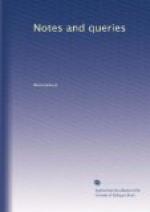Eclogarum,
libros iv., ad Episc. Parisien.
Eclogarum,
libb. ii., ad Lud. Villerium.
De
mutatione studiorum, lib. i.
Elegiam
deprecatoriam.
Et alia, quae Paris. sunt typis edita. Hujus eruditionem et Poemata Bapt. Mantuanus et Joannes Ravisius Testor epigrammate commendarunt: hic etiam in Epithetis suis Anglici auctoritatem non semel adducit.”
3. Franciscus Sweertius (Athenae Belgricoe, ed. Antv. 1628, p. 565.) gives a similar account to this of Valerius Andreas.
4. And the account given by Christopher Hendreich Brandebargca, (ed. Berolini, 1699, p. 193.) is substantially the same; viz.,
“Anglicus Michael cognomine, sed natione Gallus, patria Belmontensis, utriusque juris Professor, scripsit Eclogarum, lib. iv. ad Episc.” &c ... “Et diversorum carminum libros aliquot, quae omnia Parisiis impressa sunt. Claruit autem A.C. 1500.”
5. Moreri takes notice of this apparent confusion made between two different writers, who lived two centuries and a half apart. Speaking of the later {233} of the two, he says (Dictionnaire Historique, Paris, 1759, tom. i. par. ii. p. 87.):—
“Anglicus (Michel), natif de Beaumont dans le Hainaut, qui vivoit dans le XVI. siecle, etoit poete et professeur en droit. Nous avons divers ouvrages de sa facon, des eglogues, un traite de mutatione studiorum, &c. (Valer. Andreas, Bibl. Belg.) Quelques auteurs l’ont confondu avec Michel Blaumpain. (Voyez Blaumpain.)” #/
Of the earlier Anglicus, Moreri says (ubi sup., tom. ii. par. i. p. 506.):
“Blaumpain (Michel) surnomme Magister, Anglois de nation, et Poete, qui vivoit vers l’an 1250. Il est nomme par quelques-un Michel Anglicus. Mais il y a plus d’apparence que c’etoient deux auteurs differens; dont l’un composa une histoire de Normandie, et un traite contre Henri d’Avranches; et l’autre laissa quelques pieces de poesies;—Eclogarum, libri iv., ad Episcopum Parisiensem; Eclogarum, libri ii., ad Ludovicum Villerium, De mutatione studioram, Elogia deprecatoria, &c. Baptiste Mantuan parle de Michel Anglicus, qui etoit de Beaumont dans l’Hainault. (Pitseus, De Script. Angl. p. 322.; Valerius Andreas in Bibl, p. 670.)”
Perhaps some of your readers may have access to a copy of the Paris impression of Michael Anglicus, mentioned by Andreas, Sweertius, and Hendreich. J.B. will not need to be reminded of these words of Innocent III., in his first serm. de consecr. Pont. Max., in which he claimed, as St. Peter’s successor, to be
“Inter Deum et hominem medius constitutus; citra Deum, sed ultra hominem; minor Deo, sed major homine: qui de omnibus judicat, et a nemine judicatur.”—Innocentii tertii Op., ed. Colon. 1575, tom. i., p. 189.
Did the claim originate with Pope Innocent?




